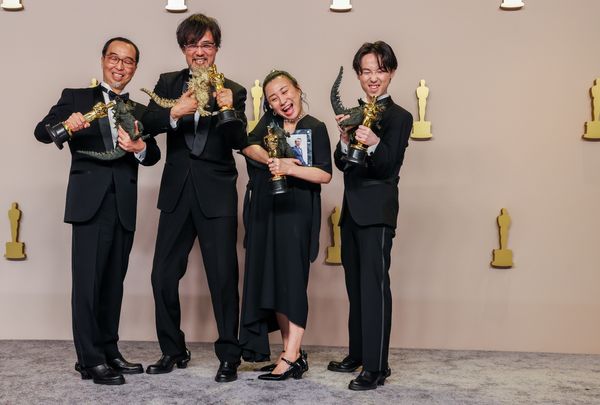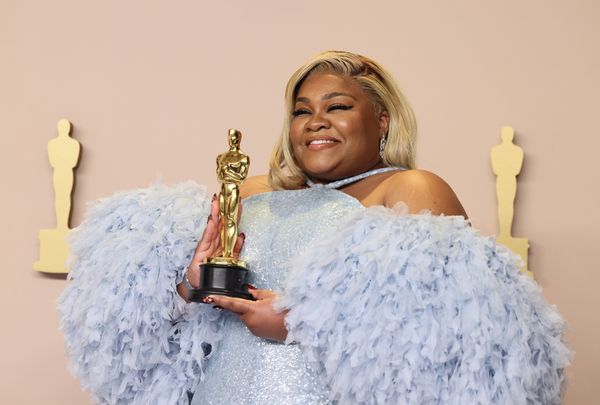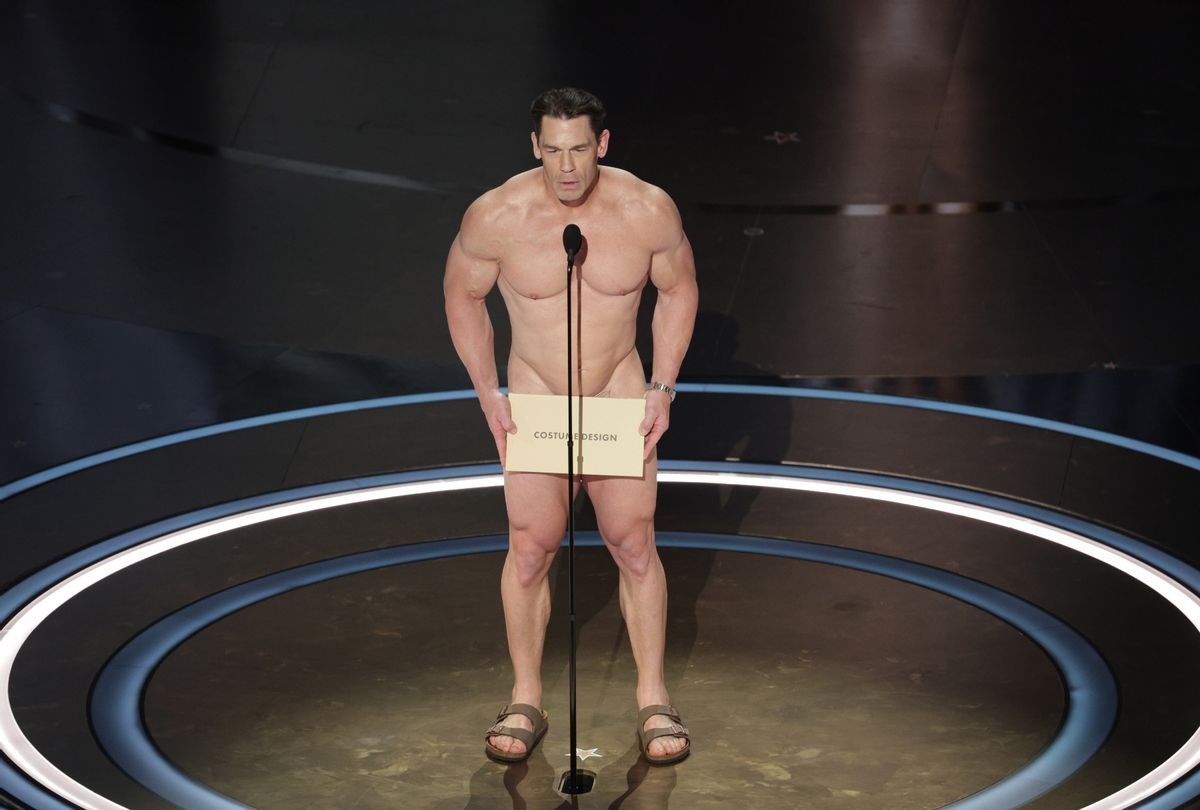For the 96th Oscars, ABC’s host Jimmy Kimmel chose to pay tribute to the unforgettable work of Robert Opel, the man who streaked the 1974 Academy Award ceremony as David Niven was presenting.
Fifty years later Kimmel enlisted John Cena for a gag he pretended to object to before sidestepping onstage wearing nothing but Birkenstocks and an Oscar envelope. “Costumes, they are so important,” he squeaked. “Maybe the most important thing there is.” Then he said he couldn’t read the winner without exposing his Peacemaker, and the lights dimmed so the nominees’ clips could run.
A few years ago some critics might have viewed this as tasteless, a sign of how far culture has fallen. But there was no way to forget that this Oscars airs while wars drag on in Ukraine and Gaza, and in the same year as a presidential election contest that’s robbed too many of us of peaceful sleep. Plus, who doesn't love a golden anniversary?
Between that, the applauding dog in the audience, and the fact that a “Godzilla” movie won an Academy Award, this Oscars ceremony was, dare I say it, a four-star good time. Not perfect by any means, but watchable television that endeavored to make celebrating the movies feel personal and accessible.
 Masaki Takahashi, Takashi Yamazaki, Kiyoko Shibuya and Tatsuji Nojima, winners of the Best Visual Effects award for "Godzilla Minus One" in the deadline room at the 96th Annual Academy Awards at the Dolby Theatre at Hollywood & Highland Center in Hollywood, CA, Sunday, March 10, 2024 (Dania Maxwell / Los Angeles Times via Getty Images)
Masaki Takahashi, Takashi Yamazaki, Kiyoko Shibuya and Tatsuji Nojima, winners of the Best Visual Effects award for "Godzilla Minus One" in the deadline room at the 96th Annual Academy Awards at the Dolby Theatre at Hollywood & Highland Center in Hollywood, CA, Sunday, March 10, 2024 (Dania Maxwell / Los Angeles Times via Getty Images)
Like the SAG Awards presenters, Kimmel established this Oscars as a post-strike victory lap for Writers Guild of America and SAG-AFTRA members.
“We were on strike for a long time, for 148 days. For five months, this group of writers, actors and directors, the people who actually make the films, said we will not accept a deal,” Kimmel said, quickly adding. “Well, not the directors. You guys folded immediately.”
Everyone laughed because it’s true. But instead of continuing to lay into the Directors Guild of America members, Kimmel praised, the below-the-line workers who stood with their guilds, bringing a group onstage to be applauded.
Kimmel is a four-time Oscar host with nothing to prove and plenty of currency banked with this crowd. The few jokes that verged on tasteless never quite went there, indicative of a man who has read the room and surmised a light touch was in order.
“How many times can one bring his mom as his date before he is actually dating his mom?” he asked “Maestro” director and star Bradley Cooper. “Are you working on a movie about Freud right now and not telling us?”
This Oscars ceremony was, dare I say it, a four-star good time.
Even his groaners had a snuggly shag to them. “At what age do you tell a screenplay that it’s been adapted?” he cracked a few beats before Cord Jefferson won best adapted screenplay Oscar for “American Fiction.”
His one indulgence was to read aloud Donald Trump’s negative review of his Oscars hosting performance on Truth Social: “Has there EVER been a WORSE HOST than Jimmy Kimmel at The Oscars?” the rant began, going on to suggest ABC replace Kimmel with “another washed up, but cheap, ABC ‘talent,’ George Slopanopoulos.”
“Thank you for watching! I’m surprised you’re still awake,” Kimmel cracked, adding, “Isn’t past your jail time?”
Overall the host understood his job was to transition, not dominate; and that this Oscars wasn’t about him but the movies.
Several key races were entirely predictable, and yet that didn’t make the show any less exciting or enjoyable. “Oppenheimer” won seven Oscars, including best picture, best director for Christopher Nolan, best actor for Cillian Murphy and best supporting actor for Robert Downey, Jr., all first winners in their individual categories.
 Da'Vine Joy Randolph, winner of Actress in a Supporting Role award for 'The Holdovers' poses in the press room during the 96th Annual Academy Awards at Ovation Hollywood on March 10, 2024 in Hollywood, California (Rodin Eckenroth/Getty Images)
Da'Vine Joy Randolph, winner of Actress in a Supporting Role award for 'The Holdovers' poses in the press room during the 96th Annual Academy Awards at Ovation Hollywood on March 10, 2024 in Hollywood, California (Rodin Eckenroth/Getty Images)
“The Holdovers” star Da’Vine Joy Randolph completed her awards season conquest by taking home the Oscar for best supporting actress, the only award the movie snagged on Sunday.
But that race was never in doubt; instead, the best actress contest was the one everyone was watching after “Killers of the Flower Moon” lead Lily Gladstone landed the SAG and the Globe and “Poor Things” star Emma Stone snagged a BAFTA. In the end, and near the close of the ceremony, Stone walked away with the golden man, and Oscar passed on an opportunity to make history by rewarding an Indigenous actor who gave one of 2023's top performances.
Stone is in no danger of disappearing from our screens, large or small. (She’s also fresh off an acclaimed run in Showtime’s “The Curse.”) Gladstone isn’t either, to be clear, but leading roles in Martin Scorsese movies don’t rain down equally on everyone.
Also, in the Academy Awards' 96-year history, only two non-white women have won Best Actress.
Producers can’t control voting outcomes. They can only make sure the machinery runs as well as live TV can and hope the presenters don’t slow the momentum and the entertainment hits as intended.
A good choice, although not everyone agrees, was to have past winners in individual acting categories speak to the performance and, when they could, the character of current nominees. Some are friends, others simply genuine admirers of their peers’ work. Like the opening monologue, this added a human layer to the proceedings instead of enforcing the distance between the industry and the audience.
These interactions replaced the movie clips of their work, which irritated some people. I’d also argue that watching a seconds-long snippet of a performance doesn’t do much for anybody who hasn’t seen it. Watch the movies, people.
Besides, that human touch inspired a few stellar speeches, like Jefferson sticking up for small-budget big swings like his instead of habitually favoring costly behemoths. “I understand that this is a risk-averse industry. I get it,” he said while accepting his Oscar. “But $200 million movies are also a risk. . . . Instead of making one $200 million movie, try making 20 $10 million movies. Or 50 $4 million movies.”
We need your help to stay independent
In that moment the audience, largely composed of people who make and star in $200 million movies, was on his side. Overall, though, a major reason this broadcast worked is because it was centered around two expensive movies many people saw and loved, although the most popular one, “Barbie,” came away with only one Oscar for best original song: “What Was I Made For?” by Billie Eilish and her brother Finneas O’Connell.
 Finneas and Billie Eilish perform onstage at the 96th Annual Oscars held at Dolby Theatre on March 10, 2024 in Los Angeles, California (Rich Polk/Variety via Getty Images)Along with that the movie and nominated star Ryan Gosling settled for winning the night as a consolation prize with his live performance of “I’m Just Ken,” surrounded by an army of dancers. Joined by his fellow Ken stars (including Simu Liu, Ncuti Gatwa and Kingsley Ben-Adir) wearing tuxes and sashes in a gender-flipped tribute to Marilyn Monroe’s legendary number from “Gentlemen Prefer Blondes,” Gosling gave a little boy band energy and plenty of Elvis, and by the time Slash took his side and the screens went full karaoke the world was Ken's.
Finneas and Billie Eilish perform onstage at the 96th Annual Oscars held at Dolby Theatre on March 10, 2024 in Los Angeles, California (Rich Polk/Variety via Getty Images)Along with that the movie and nominated star Ryan Gosling settled for winning the night as a consolation prize with his live performance of “I’m Just Ken,” surrounded by an army of dancers. Joined by his fellow Ken stars (including Simu Liu, Ncuti Gatwa and Kingsley Ben-Adir) wearing tuxes and sashes in a gender-flipped tribute to Marilyn Monroe’s legendary number from “Gentlemen Prefer Blondes,” Gosling gave a little boy band energy and plenty of Elvis, and by the time Slash took his side and the screens went full karaoke the world was Ken's.
Some credit is due to starting the broadcast an hour earlier than usual, ensuring everyone was awake and in high spirits for the Kendom takeover. The show ended a few minutes under the expected three and a half hours – and would have even if Al Pacino hadn’t skipped over the reading the best picture nominees in presenting the final award.
There was no way to ignore the reason this telecast began six minutes late: an enormous protest calling for a ceasefire in Gaza disrupted Los Angeles traffic to such a degree that some attendees chose to walk part of the way.
If an Oscars show fulfills the promise of the movies...we should take the win.
Many actors showed their solidarity by wearing red pins on their tux lapels and gowns, but only “The Zone of Interest” director Jonathan Glazer explicitly used his acceptance speech for winning best international picture to call for a ceasefire in the Israel-Hamas war.
“Our film shows where dehumanization leads at its worst. It shaped all of our past and present,” Glazer said. “Right now we stand here as men who refute their Jewishness and the Holocaust being hijacked by an occupation which has led to conflict for so many innocent people, whether the victims of October the 7th in Israel, or the ongoing attack on Gaza, all are victims of this dehumanization. How do we resist?”
The Oscar for “Zone of Interest” is the first ever for the United Kingdom,” just as “20 Days in Mariupol,” is the first ever for Ukraine, producer/director Mstyslav Chernov pointed out in his acceptance speech, which quickly turned heartbreaking.
This reminded us of ever-present mourning in the world better than In Memoriam segment which aside from Andrea Bocelli singing “Time to Say Goodbye” with his son Matteo, was rushed to the verge of disrespect and made the deceased names small and unreadable.
Truly disappointing, though, is the fact that it began powerfully by featuring a few moments from the 2023 documentary Oscar winner “Navalny” – specifically, a rallying speech from recently killed Russian dissident Alexei Navalny. “Listen, I’ve got something very obvious to tell you. You're not allowed to give up. If they decide to kill me, it means we're incredibly strong. . . . The only thing necessary for the triumph of evil is for good people to do nothing.”
It should not go unnoticed that the only winners or presenters to say anything about the horrors in Gaza and Ukraine are non-American directors, and the only figure to speak out against Vladimir Putin’s corruption and violence is a dead man.
Want a daily wrap-up of all the news and commentary Salon has to offer? Subscribe to our morning newsletter, Crash Course.
Hollywood remains a very political town where a go-along-to-get-by mentality reigns, and the days of Sean Penn or Richard Gere taking the stage to make overt pleas for human rights in distant lands seem to be long past.
At the same time, that we can recall those moments from Oscar ceremonies that were as memorable and entertaining to watch as this one bolsters the worthiness of this Oscars round.
The nude runner in 1974 may be what stays with us, but this is what Niven said before Opel took the stage: "If one reads the newspapers or listens to the news, it is quite obvious that the whole world is having a nervous breakdown."
That is a constant, including on the one night each year when we pin our hopes on art and performances we love. Within that capsule, too, there’s always disappointment.
But the two sides can harmonize, speak to each other, and help us to hear and feel more clearly. “Cinema forms memories and memories form history,” Chernov told his fellow filmmakers and performers. As a sign, perhaps, that his message resonated, Murphy wrapped his acceptance speech by acknowledging the dark truth about the man he plays.
“We made a film about the man who created the atomic bomb, and for better or worse, we’re all living in Oppenheimer’s world,” Murphy said, “so I’d like to dedicate this to the peacemakers everywhere.”
If an Oscars show fulfills the promise of the movies – that is, if it allows us to step outside our melancholy and anxiety for a time and appreciate the possibility, craft and beauty in entertainment — we should take the win.
Read more
about the Oscars

Shares